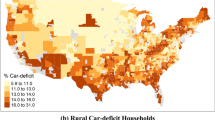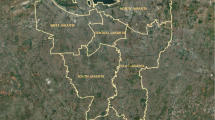Abstract
Urban travel demand analysis efforts predominantly use household travel surveys for data supports, especially in North America. However, proxy-biases and under-representations are two dominant issues looming over the practice of using household travel surveys. Proxy biases arise from the fact that one household member reports travel diaries on behalf of all household members, often with incomplete knowledge. Under-representation arises from various reasons, including insufficient coverage of sample frame of all population segments/strata. This paper proposes a hybrid approach of data fusion between a core household travel survey dataset and data from a specialized travel survey (termed as a satellite survey) to reduce both proxy-biases and under-representation in the core dataset. Taking the Greater Toronto Area as the study area, it uses a household travel survey, the Transportation Tomorrow Survey dataset to fuse with a travel diary survey of post-secondary students in Toronto. The proposed methodology uses simulation of travel diaries (based on a dynamic econometric model of activity-travel scheduling) to correct the proxy biases of the reported travel diaries of the post-secondary students living with families and direct insertion of travel diaries (from the satellite survey) of post-secondary students living on-campus who were not well-represented in the core survey. Results prove that the proposed methodology corrects the average trip rates of this particular sub-group of the population (post-secondary students) while preserving the key travel behaviour in the core dataset.







Similar content being viewed by others
References
Ahmadreza, F., Vaughan J., Miller, E.J.: Draft: Analysis of TTS 2016 Trip Rates. Retrieved July 2, 2020 (2018)
Ai, C., Norton, E.C.: Interaction terms in logit and probit models. Econ. Lett. 80(1), 123–129 (2003). https://doi.org/10.1016/s0165-1765(03)00032-6
Aluja-Banet, T., Daunis-I-Estadella, J., Pellicer, D.: GRAFT, a complete system for data fusion. Comput. Stat. Data Anal. 52(2), 635–649 (2007). https://doi.org/10.1016/j.csda.2006.11.029
Ampt, E., Hickman, M.: Workshop Synthesis: Survey Methods for Hard-to-Reach Groups and Modes (2015). Retrieved July 03, 2020, from https://www.sciencedirect.com/science/article/pii/S2352146515003300
Aptech Systems.: Gauss User’s Manual (2016). from http://www.aptech.com/
Badoe, D.A., Steuart, G.N.: Impact of interviewing by proxy in travel survey conducted by telephone. J. Adv. Transp. 36(1), 43–62 (2002)
Bayart, C., Bonnel, P., Morency, C.: Survey mode integration and data fusion: methods and challenges. Transp. Surv. Methods (2009). https://doi.org/10.1108/9781848558458-034
Ben-Akiva, M.E., Lerman, S.R.: Discrete Choice Analysis: Theory and Application to Travel Demand. MIT Press, Cambridge (1985)
Bose, J., Giesbrecht, L.: Patterns of proxy usage in the 2001 National Household Travel Survey. ASA: Survey Research Methods, Bureau of Transportation Statistics (2004).
Castiglione, J., Bradley, M.A., Gliebe, J.: Activity-based travel demand models: a primer. Transportation Research Board, Washington (2015)
City of Toronto.: Transportation Master Plan (2017). Retrieved July 3, 2020, from https://www.toronto.ca/legdocs/mmis/2017/pg/bgrd/backgroundfile-103947.pdf
D’Ambrosio, A., Aria, M., Siciliano, R.: Robust Tree-Based Incremental Imputation Method for Data Fusion. In: Berthold, M.R., Shawe-Taylor, J., Lavrač, N. (eds.) Advances in Intelligent Data Analysis VII. IDA 2007. Lecture Notes in Computer Science, vol. 4723. Springer, Berlin (2007). https://doi.org/10.1007/978-3-540-74825-0_16
Data Management Group.: 2016 Transportation Tomorrow Survey Data Guide (2018a). Retrieved July 03, 2020, from http://dmg.utoronto.ca/pdf/tts/2016/2016TTS_DataGuide.pdf
Data Management Group.: 2016 Transportation Tomorrow Survey Design and Conduct of the Survey (2018b). Retrieved May 31, 2021, http://dmg.utoronto.ca/pdf/tts/2016/2016TTS_Conduct.pdf
Dianat, L., Habib, K.M.N., Miller, E.J.: Modeling and forecasting daily non-work/school activity patterns in an activity-based model using skeleton schedule constraints. Transp. Res. Part A Policy Pract. 133, 337–352 (2020). https://doi.org/10.1016/j.tra.2020.01.017
Goulias, K.G., Pendyala, R.M., Bhat, C.R.: Keynote—total design data needs for the new generation large-scale activity microsimulation models. Transp. Survey Methods Best Pract. Decis. Mak. (2013). https://doi.org/10.1108/9781781902882-002
Greene, W.H., Hensher, D.A.: Modeling ordered choices: a primer. University Press, Cambridge (2010)
Habib, K.M.N., El-Assi, W., & Lin, T.: How Large is too Large? The Issue of Sample Size Requirements of Regional Household Travel Surveys, the Case of the Transportation Tomorrow Survey in the Greater Toronto and Hamilton Area (2016). Retrieved July 11, 2020, from https://arxiv.org/ftp/arxiv/papers/2005/2005.00563.pdf
Habib, K.M.N.: A comprehensive utility-based system of activity-travel scheduling options modelling (CUSTOM) for worker’s daily activity scheduling processes. Transportm. A Transp. Sci. 14(4), 292–315 (2018a). https://doi.org/10.1080/23249935.2017.1385656
Habib, K.M.N.: Modelling the choice and timing of acquiring a driver’s license: revelations from a hazard model applied to the University students in Toronto. Transp. Res. Part A Policy Pract. 118, 374–386 (2018b). https://doi.org/10.1016/j.tra.2018.09.012
Habib, K.M.N., Miller, E.J., Srikukenthrian, S., Lee-Gosselin, M., Morency, C., Roorda, M., & Shalaby, A.: TTS2.0: A research and development (R&D) project on passenger travel survey methods (2018). Retrieved July 03, 2020, from https://www.sciencedirect.com/science/article/pii/S2352146518301558
Kay, R., Little, S.: Assessing the fit of the logistic model: a case study of children with the haemolytic uraemic syndrome. Appl. Stat. 35(1), 16 (1986). https://doi.org/10.2307/2347860
Kriger, D., Wolff, R., Ahmad, S., Cleghorn, D.: Trends in Urban Travel: Implications for Planning and Forecasting, paper prepared for presentation at the “Success Stories in Urban Transportation Planning Practices” Session of the 2011 Annual Conference of the Transportation Association of Canada Edmonton, Alberta August 2011 (2011).
Maruyama, T., Hosotani, K., Kawano, T.: Inferring proxy response in household travel surveys with unknown completer using a group-based choice model. Transportation (2019). https://doi.org/10.1007/s11116-019-10053-3
Miller, E.J., Vaughan, J., King, D., Austin, M.: Implementation of a "Next Generation" Activity-Based Travel Demand Model: The Toronto Case (2015). Retrieved July 03, 2020, from https://www.tac-atc.ca/en/conference/papers/implementation-next-generation-activity-based-travel-demand-model-toronto-case
Morency, C.: What about Proxy Respondent bias Over Time? - cirrelt.ca (2015). Retrieved July 2, 2020, from https://www.cirrelt.ca/documentstravail/cirrelt-2015-55.pdf
Oakil, A. T. M., Ettema, D., Arentze, T., Timmermans, H.: A longitudinal analysis of the dependence of the commute mode switching decision on mobility decisions and life cycle events. In: Proceedings of the 16th International Conference of Hong Kong Society for Transportation Studies. Hong Kong, China (2011).
Ortúzar, J.D., Willumsen, L.G.: Modelling Transport. Wiley, Chichester (2014)
OCAD University.: General information (2016). Retrieved July 03, 2020, from https://www.ocadu.ca/about/accountability/cudo-2016/general-information
Region of Peel.: Long Range Transportation Plan (2019). Retrieved July 3, 2020, from https://www.peelregion.ca/officialplan/review/pdf/long-range-transportationplan.pdf
Region of York.: Transportation Master Plan (2017). Retrieved July 3, 2020, from https://www.york.ca/wps/wcm/connect/yorkpublic/d7ec2651-8dc5-492e-b2a0-f76605edc122/16296_TmpFinalBigBook_NovWEBFIX.pdf?MOD=AJPERES&CVID=mukDpNz
Ryerson University.: Common University Data Ontario (CUDO) (2016). Retrieved July 03, 2020, from: http://www.ryerson.ca/university-planning/data-statistics/common-university-data-ontario/
Rodgers, W.L.: An evaluation of statistical matching. J. Bus. Econ. Stat. 2(1), 91 (1984). https://doi.org/10.2307/1391358
Roorda, M.J., Miller, E.J., Habib, K.M.N.: Validation of TASHA: A 24-h activity scheduling microsimulation model. Transp. Res. Part A Policy Pract. 42(2), 360–375 (2008). https://doi.org/10.1016/j.tra.2007.10.004
Srikukenthiran, S., Loa, P., Hossain, S., Chung, B., Habib, K.N.M., Miller, E.J.: TTS 2.0 Research Report (2018). Retrieved July 2, 2020, from https://uttri.utoronto.ca/files/2020/04/UTTRI-Report-TTS-2.0-Srikukenthiran-2018.pdf
StudentMoveTO.: StudentMoveTO (2015). Retrieved July 03, 2020, from http://www.studentmoveto.ca/
Train, K.: Discrete Choice Methods with Simulation. Cambridge University Press, Cambridge (2009)
University of Toronto.: Enrolment Report 2016–17—Planning and Budget (2017). Retrieved July 3, 2020, from http://www.planningandbudget.utoronto.ca/Assets/Academic+Operations+Digital+Assets/Planning+$!26+Budget/Enrolment+Report+2016-17.pdf
Verreault, H., Morency, C.: Integration of a phone-based household travel survey and a web-based student travel survey. Transportation 45(1), 89–103 (2016). https://doi.org/10.1007/s11116-016-9726-2
Wargelin, L., Kostyniuk, L.: Proxy respondents in household travel surveys. Travel Survey Methods (2006). https://doi.org/10.1108/9780080464015-010
Weir, D., Faul, J., Langa, K.: Proxy interviews and bias in the distribution of cognitive abilities due to non-response in longitudinal studies: a comparison of HRS and ELSA. Longitudinal Life Course Stud. 2(2), 170–184 (2011). https://doi.org/10.14301/llcs.v2i2.116
York University.: York University Factbook (2017). Retrieved July 03, 2020, from http://www.yorku.ca/factbook/factbook/index.php?year=2015+-+2016
Acknowledgements
The study was funded by an NSERC Discovery Grant and Percy Edward Hart Professorship Grant. The authors bear the sole responsibility for all results, interpretations, and comments made in the paper.
Author information
Authors and Affiliations
Contributions
The authors confirm contribution to the paper as follows: Study conception and design: K. Wang, S. Hossain, K.M.N. Habib; Data collection: S. Hossain, K. Wang; Analysis and interpretation of results: K. Wang, S. Hossain; Draft manuscript preparation: K. Wang, S. Hossain; Overall project supervision: K.M.N. Habib. All authors reviewed the results and approved the final version of the manuscript.
Corresponding author
Additional information
Publisher's Note
Springer Nature remains neutral with regard to jurisdictional claims in published maps and institutional affiliations.
Rights and permissions
About this article
Cite this article
Wang, K., Hossain, S. & Habib, K.N. A hybrid data fusion methodology for household travel surveys to reduce proxy biases and under-representation of specific sub-group of population. Transportation 49, 1801–1836 (2022). https://doi.org/10.1007/s11116-021-10228-x
Accepted:
Published:
Issue Date:
DOI: https://doi.org/10.1007/s11116-021-10228-x




